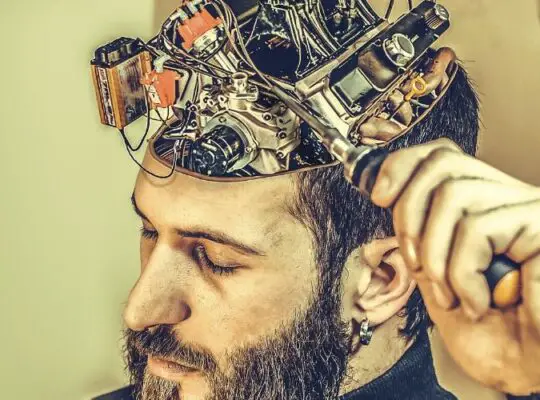When you are working on bettering yourself, your first inclination may be to make a list of your flaws and start devising a plan for how to improve yourself.
But, if you started with this approach, your chances of really making lasting, transformative change are not particularly good. If you really want to change your life and become the best version of yourself you can be, then the place to start is with your mindset.
Positive thinking gets a lot of credit for many things in the self-help world today, but there are good reasons for that. If you want to achieve your personal development goals, then start with a change in your mindset to embrace more positive thinking.
This guide explores the importance of positive thoughts for personal growth, and we even share some of the most effective ways to learn to think more positively. We share information on how positive thinking affects the brain and its role in personal development, as well.
Understanding Personal Development
Each of us is engaged in a lifelong process of learning to be the best version of ourselves. Some people are more in tune with the process or embrace it more easily than others. Those that are most interested in realizing their full potential and becoming self-actualized will set goals and create plans that help them improve themselves. This is known as personal development.
The process of personal development starts when you assess your skills and personality traits, figure out what your goals and dreams are for your life, and then you decide what you need to do to realize your full potential and maximize your happiness in life.
Personal development is different for every person, so there is no one right way to engage in this process. But, overall, most people want to improve their success in life, be happier with themselves and others, feel more confident, and live as the best version of themselves they possibly can. To do this, you must make relevant, productive, and positive decisions and engage in healthy and positive actions that will lead to your personal empowerment.
Personal development is crucial because it leads to self-actualization, which in the inherent need and driving force within every person to “become everything that they are capable of becoming,” according to psychologist Abraham Maslow. Self-fulfillment is the result of our hard work, dedication, and focus toward reaching our full potential as human beings.
To reach that potential, though, you will encounter obstacles, you must make changes to your emotions and choices, and you must become clear about who you are and what you want. And your mindset plays a significant role in that process. Below, we explore the connection between mindset and personality, as well as how your attitude influences your choices and emotions.
How Your Mindset Affects Your Brain
Your overall perspective and attitude have a considerable influence on how you think, what you believe, and how you process the world around you. Your mindset even influences how your brain works in significant ways. In this section, we explore how negative and positive thinking impact the brain, which has profound implications for everything you think, do, and feel. Let’s see just what those influences are.
The Impact of Negative Thinking on the Brain
Our brains are fascinating organs that have some funny little tricks to them. And many of these processes and habits of mind evolved millions of years ago when we as a species first started making sense of the world and understanding how to survive in it. Take, for example, our response to negative emotions.
Our brains have a very specific response to negative feelings, such as fear, anger, or stress because these are emotions that signal threats, problems, and issues that could harm us or prevent us from thriving.
While our ancestors had to worry about death from animal attacks, famine, or other people who were vying for scarce resources, they needed brains that helped them in times of crisis or worry. As such, our brains evolved to respond to these types of emotions in a specific way.
When you experience fear or other negative feelings, your mind narrows its focus. It only sees the thing that is threatening or causing you pain. When this happens, you often have difficulty even seeing options for how to get yourself out of your current situation or prevent further harm. This tunnel vision response was once a helpful tool for survival, but in today’s world, it is less so.
While this response evolved to help protect us from danger, it has vastly different consequences for most people today. For example, if you are arguing with someone, your anger causes you to focus only on the other person, which can cause you to neglect yourself as well as others who are important in your life. That anger can even affect other aspects of your health and well-being if you do not handle it appropriately.
Stress is another negative emotion that results in a narrowed focus. For example, when you have a lot to do, the brain’s response to stress can make it hard even to get started doing anything because you have become paralyzed by the thought of how much needs to be done.
Self-sabotaging behaviors are the result of this response to negative emotions as your brain tries to justify why you can’t do something, make a better choice, or change your situation.
By closing off the outside world and focusing solely on your negative emotions, your brain is preventing you from seeing the facts clearly and from using your rational mind to come up with solutions to your problem while keeping you focused on the fear, stress, or anger that triggered this reaction. So, if this is your survival instinct, and this is how your brain reacts to negative input, what happens with your experience something positive?
The Impact of Positive Thinking on the Brain
Positive emotions have the opposite effect on your brain. Instead of narrowing your focus, to help you “survive,” positive feelings open your mind up to new possibilities and expand your understanding and enjoyment of the world.
When you are having positive emotions, including joy, love, and contentment, your brain responds by seeing more possibilities than if you were experiencing neutral or negative emotions. Positive feelings, therefore, broaden your sense of possibility while opening your mind to more options than you realized you had.
If you think about the purpose of the narrowing, we just explored related to negative emotions, this expansion effect is logical. When you are threatened, your brain wants to protect you by directing your focus to the thing that is causing potential harm.
When you are happy or feel more positive, your mind notices this and says, “Hey, this is good. We like this. Let’s look for more ways to keep feeling this way.” By opening your perceptions and senses to more possibilities, you are more likely to find more and different things that evoke positive feelings, too.
Positive emotions have other influences on your brain, though. This broadening effect can help you build skill and develop personal resources that you can use for the rest of your life.
Because positive feelings broaden your sense of possibility and open your mind, you are more likely to want to learn new skills or acquire new knowledge in the pursuit of things that bring you these positive feelings. Not only can these skills make you happy, but they can also improve your life and make you more successful.
Here is an example. When you have positive feelings connected to learning a new hobby, you are much more likely to see that having leisure activities is essential in your life, which means you are more likely to keep learning new ways to spend your free time.
One of these hobbies could spark so much joy that you decide to find a way to make this your job. In this case, your hobby becomes a calling and one that becomes a life-long passion for you.
When you experience positive emotions, you want to do things that will improve your future, whereas negative emotions make the future seem irrelevant or meaningless. There is no point in preparing for the future if it is going to suck, right? In what other ways does positive thinking benefit your life? That is what we discuss next.
The Importance of Positive Thinking
Each person is unique, and our personalities are a part of what makes us each special. When it comes to your underlying mindset, embracing positivity will inform your emotions, beliefs, and behaviors, influencing everything you think, do, and feel.
And being a positive thinker does not just broaden your thinking, as we previously shared. In fact, the benefits of positive thinking may surprise you. Here are some of the most important ones that researchers have identified.
Positive Thinking Helps Improve Your Health
Those with a positive mindset enjoy greater overall well-being, less stress, and improved physiological health. In recent years, researchers have uncovered the power of the positive mindset to boost your immunity and help you resist infections.
In other words, staying positive helps your body by creating a stronger resistance to everyday germs as well as more serious illnesses. In fact, those with a more positive attitude live longer.
Because positive thinking lowers stress levels, your mindset plays a crucial role in your overall health in other ways, too. Stress is a negative influence on many important body systems, including your heart, blood sugar, hormone levels, and digestion.
When you are stressed out, your blood pressure rises along with blood sugar levels, and your metabolism slows down, leading to gastrointestinal problems. By reducing stress, you improve the function of these important systems and processes, and your body works more efficiently.
Those with a positive mindset are also more likely to handle mental health issues, including depression and anxiety better. This includes a reduction in symptoms, stricter adherence to medication schedules, and reaching out to mental health professionals during times of crisis.
Your mindset helps you adopt new habits, so when your attitude is more positive, your choices are more likely to support a healthy lifestyle. People with a positive mindset exercise more, eat healthier, and get better rest.
Positive Thinking Makes You More Resilient
Your resilience includes your ability to cope with problems and bounce back from troubling times. When you are resilient, you act well in a crisis, you have personal strength, and your resolve is high.
During times of stress, your positivity can keep you from falling apart so that you can work to overcome adversity.
Positivity keeps your mind open to more possible solutions, helps you solve problems better, and stick with it until a solution is found.
Positivity helps during times of intense crisis, such as after a death or after surviving trauma or a natural disaster. Your positive mindset can protect you from depression or guilt, and it helps you find the lessons to learn or the silver lining in each these darkest of times. Positive people tend to have wider social circles, too, which become an immense source of support during trying times, as well.
Thinking Positively Helps You Cope with Disappointment
Those in stressful situations or dealing with disappointment are better equipped to handle this adversity when they have a positive mindset. Thinking positively helps you focus on the things you can do to resolve your situation and recognize which things are outside of your control or influence.
Being positive helps you devise a plan of action or ask for help or advice from other people. And your positive attitude allows you to see that setbacks are temporary and defined to only one part of your life, not an indication that you are a failure or that life is terrible.
A Positive Mindset Improves Your Relationships
When you are open and positive, you make a better first impression on people, people are more likely to trust you, and you attract others with a positive mindset.
You are more likely to make new friends or find a romantic partner with a positive mindset, and people who are positive have more active social lives.
After all, people do not want to spend time with friends who are negative, always complaining, or lack the ability to be supportive.
Positive Thinkers are Happier and More Successful
Being positive helps you attain your goals, which allows you to be happier and enjoy a better life. When you are positive, you are open to learning and growing, which makes you more likely to take advantage of opportunities and explore possibilities.
Positive people are more often selected as leaders, which raises them to higher levels of achievement in the workplace. And when you have a positive mindset, you get more done, which makes you more productive and able to reach more goals in your life.
Improve Positive Character Traits with Your Mindset
Since personal development is about developing new character traits as well as better habits to reach your goals, it is also important to understand how thinking positively can influence your positive character traits.
When you think more optimistically, you develop traits that help you grow in every aspect of your personal and professional life and cultivating positive thinking can help you develop these even more. Below, we explore the many positive character traits most associated with a positive attitude.
Optimism
When you learn to think positively, you develop optimism about your future, other people, and the world in which you live.
Optimism is the ability to think hopefully and confidently about the future, including your ability to make a difference in it and choose your own destiny. Being optimistic gives you something to look forward to and a general belief that things will work out.
Adaptability
Because being more positive opens your mind to new and more varied possibilities, you become more adaptable in dealing with other people, difficult circumstances, or challenges in life. You see that there are many ways to resolve problems, and your thinking is more flexible than if you embraced a more negative outlook.
Passion
When you think more positively, you are excited to achieve remarkable things, and you have a passion for sharing your ideas and wonder with the world. Positivity breeds enthusiasm for life and for the attainment of those goals that bring you joy and peace.
Self-Confidence
Because of your positive attitude, your self-esteem will grow and flourish. Positive thinking allows you to see the good in other people while also realizing your own talents and capabilities.
When you feel positive, you want to share this with other people, which also gives you more confidence in yourself, as you see how you can make a difference in others’ lives.
Self-Discipline
When you have a more positive outlook, you believe in the positive differences you are making in your own life, which makes you even more likely to stick with new habits and to make even more significant changes to your life. When you are striving for personal development, self-discipline is a necessary trait to have, and positive thinking can help you grow this trait.
Your Turn: Positive Thinking Exercises for Personal Development
So, that you see the connection between thinking positively, developing positive character traits, and realizing your goals in life, you are ready to improve your outlook to achieve your personal development goals.
The following strategies can, with practice and patience, help you develop a more positive way of thinking, which can enable you to reach your full potential.
Meditate
Those who engage in regular meditation have more positive emotions than those who do not. Meditation is a practice that increases your mindfulness, helps reduce your stress, connects you more to yourself, and decreases emotional and physical illnesses and symptoms.
All these things can make you feel more positive about life and yourself. Setting up a daily meditation practice is a simple yet effective way to bring focus to your life, improve your positivity, and allow you to concentrate on your personal growth.
Start small and use guided meditations to get you into the right habit in the beginning. There are many wonderful apps and podcasts that you can use to get started with a daily meditation practice, and once you start, you will quickly see how impactful it can be on your thinking and outlook.
Write About Positive Things in Your Life
Journaling is often touted as an effective strategy for supporting personal growth as well as positive thinking. If you really want to enhance your attitude, you should journal about positive experiences in your daily life.
When you take the time to write about uplifting or optimistic things that occurred in your day, you start to notice even more things about your life that are positive (remember that broadening effect?). And writing about fortunate outcomes leads to better mood levels.
Writing is a reflective process, and the more you regularly write the more you will enjoy these benefits. Some people find that journaling just before bed is the perfect way to end their day and put them in the right headspace to fall asleep peacefully.
Repeat Positive Affirmations
If you want to improve your mindset, you need to start by using your conscious mind to influence your subconscious thinking. And the way to do this is by using positive affirmations. These are statements you make about yourself in the present tense.
When you say them aloud, and you repeat them often, your subconscious hears the message and starts to internalize this as part of your new reality. So, when you say, “I am successful and make a difference for other people,” your subconscious mind believes this to be true, so it starts making different choices that align to this new reality.
Affirmations are a way to manifest more positive thinking and action into your life. Pick a few sentences that focus on your personal growth goals and say them out loud to yourself in morning and evening. Over time, your repetition will retrain your brain into believing these new, more positive thoughts, and your mind will start looking for opportunities to make these come true.
Find the Good in Every Situation
No matter the situation or circumstance, there is always something positive on which you can focus. When you have a terrible day or encounter a negative outcome, instead of thinking the worst or concentrate on what is wrong, instead try to find at least one benefit. No matter how small, you can always find something positive.
Over time, you will start to see more and more of these benefits or positive aspects, even in the worst of situations. It takes intention and practice, but there is always a silver lining in every dark cloud.
Learn from Failures
No one is perfect, and you should not expect that you will be, either. You are going to make mistakes, and sometimes, you will even fall flat on your face. More important than whether you failed is what you learn from that setback that you can apply to your next attempt. Instead of wallowing in your failure, think of what lessons you have been given, which can help you succeed the next time around.
Some of the most successful people have failed many times in their lives, but they will each attest to the importance of what they learned from those failures that helped to get them to their current successful situation.
Change How You Talk to Yourself
There is an inner voice within each of us that lets you know how you think about yourself. Self-talk is the manifestation of your self-esteem and subconscious mind, and it delivers powerful messages that influence your positive mindset.
When you notice that your self-talk is critical or negative, change those into more positive messages. Turn criticism into an opportunity to plan for growth and improvement. Learn to hear this negative self-talk and transform it into a chance to improve your positivity.
Be Present and Mindful
Instead of worrying about things that have not happened yet or dwelling on the past, it is essential to focus on the present when you are trying to cultivate a positive outlook. And living in the present is crucial for personal development, too.
When you focus on the present, you can see the immediate actions you can take to improve your situation, and you see opportunities that are right in front of you that can help you grow and succeed. None of that is possible when your attention and thoughts are elsewhere.
Create a Positive Support System
If you are trying to become a better you, then surrounding yourself with positive people is vital. Finding friends, mentors, role models, and partners who are positive, supportive, and caring is necessary when you are engaged in the hard work of personal fulfillment.
When you surround yourself with positivity, you are more likely to remain positive, which keeps you focused on your goals. Select positive role models who have transformed their own mindsets to help you make the necessary adjustments to your thinking, as well. And if someone does not support your goals or new way of thinking, they do not deserve a place in your life.
Use Music to Boost Your Positive Attitude
Music is a powerful motivator, and it instantly lifts your mood. When you are struggling with negativity, try turning on your favorite, uplifting song. Crank up that volume and sing along, and you will soon notice a significant difference in your mindset.
Music speaks to a part of your brain that responds to positivity and happy emotions, and you will quickly notice that you have a smile on your face with good music in your heart.
Practice Deep Breathing
Deep breathing has long been recognized as a habit that encourages positivity. Why do you think so many monks and yogis are so happy? Deep breathing calms your nervous system, brings more oxygen to your brain, and improves blood flow. All of these stimulate brain activity, which you can use to focus on the positive aspects of your life.
Sit comfortably and practice filling your lungs as fully as possible, then exhaling slowly through your mouth. Try to make your exhale last twice as long as your inhale. Taking just four or five deep slow breaths like this will calm you, boost your mood, and help you focus on the positivity in your life.
Smile Often, Laugh More
Sometimes, you can fool your brain into thinking you are happy by making the motions it associates with that positive emotion. When you smile, your mind believes you are experiencing something positive, and it responds with more positive emotions.
Many times, though, we forget to smile even when we are already happy, so learning to smile more often can improve even and already-positive outlook.
Laughter is another positive action that can help lift your mood. If you are feeling negative or like dark clouds are following you around, watch a funny video or read some humorous anecdotes to give yourself a laughter break.
Once you start laughing, you will feel better and your mood will lift. And because laughter is contagious, try doing something fun and funny with other people so that you can share the positive moment with others.
Create a Positive Environment
Your surroundings influence your mood, as well. If you are trying to think more positively, then your environment needs to support those emotions. Create a space that brings you peace and joy and ditch any influence that tends to bring you down.
Consider how lighting, color, temperature, smells, and sounds all control your outlook, and make adjustments whenever possible. Creating a positive environment will surround you with the right energy to help cultivate a better mindset as well as enable you to engage in your personal growth journey.
Get Outside
Spending more time outside is a simple, effective, and inexpensive way to improve your outlook. For starters, sunshine is great for your attitude. Many people are deficient in Vitamin D, which helps regulate your mood, and exposing your skin to the sun for just 10 minutes per day helps your body produce this critical vitamin.
Secondly, being in nature and breathing in fresh air is also proven to enhance mood. The next time you need an energy boost or to brighten your mood, take a short walk outside, and you will notice a tremendous and instant difference in your mindset.
Help Others
When you have a positive mindset, you realize that life is not all about you, and being happy makes you want to share your joy with other people. Caring about the needs and feelings of other people means you are empathetic, a personality trait we should all strive to attain.
If you want to do something good for yourself as well as for others, find a way to help someone else out. When you spend time helping other people, and you do it because you genuinely care, your attitude becomes more positive, and you view the world a little differently.
Doing a good deed is not difficult, as there are plenty of people who need help. You can look for volunteer opportunities in your local community, spend time at an area hospital or nursing home visiting with sick patients, or perform random acts of kindness throughout your day.
The more you do honorable deeds, the better you will feel, and the more you will want to help other people. If you have a unique talent or skill, find ways to share this with others. The more you share positivity with the world, the more positivity will come back to you in other ways.
Be Grateful
Learning to be more grateful for your life and the people in it generates a more positive outlook. Three times per day, stop and think about your gratitude. Write down, say aloud, or text yourself a text about the moments of appreciation you have experienced. Reflect on your list often.
The more you look for positive moments, the more you will see positive moments, so thinking about your gratitude can actually create more things to be grateful for in your life. Be sure you show your appreciation to the people in your life who support and care for you, as well.
Take Responsibility
To increase your positive attitude, you first need to accept responsibility for your own life thus far. Everything that has happened in your life thus far is the result of your direct actions and decisions regarding the circumstances of your life.
And those actions came about become o your feelings and thoughts. Owning your feelings as well as how they influence you helps you to see the difference you make in your life. And once you know that effect, you understand the real power you have to make whatever changes you want.
Instead of blaming others or “fate,” accepting responsibility allows you to embrace that power and use it to make a positive difference in your life. You can control your emotions, and you can manage your reaction to life’s many trials. You can make choices and respond to others in productive ways. Learning to accept responsibility allows you to embrace positive power and control your future.
Compliment Others
When you want to make yourself feel better, try giving genuine compliments to other people. Looking for the goodness in other people helps you see your own gifts and talents, and it makes you feel better to make someone smile. And when you put out positive energy into the world, it is more likely to come back to you.
Be Good to Your Body
Taking care of your health is an important part of maintaining a positive outlook. Exercise, eating healthy foods, getting enough sleep, and doing things that support a healthy mind are all excellent ways to help you cultivate positivity while also supporting your own growth and development. When you feel strong and healthy, you can tackle the world and anything it throws your way.
Final Thoughts
Learning to think positively is not just something you do to feel happier. While it does enhance your enjoyment of life and help you feel more healthy emotions, positive thinking is what will see you through adversity, help you solve problems on the way to reaching your goals, and keep you exploring and learning about the world.
Find ways to build positivity and express your happiness in life. Explore your passions, build on your strengths, share with other people, and create a healthy and dedicated support system that encourages you to be the best version of yourself.
The more positivity you bring into your life, the more likely you are to reach your goals and to experience the long-term benefits of this type of mindset. And learning to be a happier, healthier you starts by embracing the power of the positive mind.







